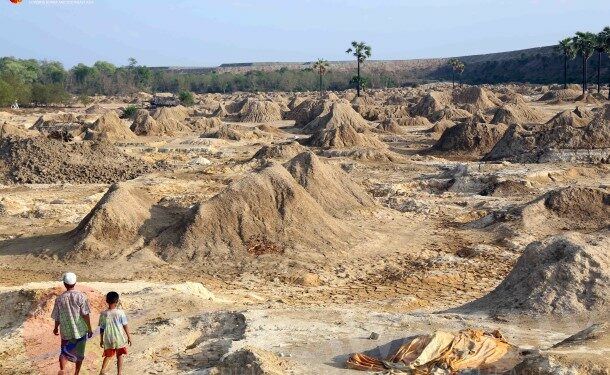RANGOON — The Chinese firm Wanbao’s Burma subsidiary has reportedly told locals in the Letpadaung mine area that it has no plan to compensate them further, after hundreds of would-be farmers sought payment for crops forgone last year due to the project.
On Tuesday, responsible officials from Wanbao and Sagaing Division’s security and border affairs minister, Col. Kyaw Thant Naing, told the locals that compensation would not be provided in lieu of the money that a 2015 harvest might have yielded, according to Mar Mar Cho, a resident of Tonywa village.
The controversial copper mine is a joint-venture between Myanmar Wanbao Mining Copper Limited and the Burma Army-owned Union of Myanmar Economic Holdings Ltd. (UMEHL).
Affected farmers, many of whom have not accepted compensation for their confiscated lands, were given recompense for their crops ranging from between 200,000 kyats (US$154) and 400,000 kyats per acre in December 2014, after Wanbao had fenced off their lands.
Since December of last year, locals have similarly been demanding a year’s compensation for crops for 2015, as well as jobs. They are seeking payment for the crops that they would otherwise have grown on their land if it had not been confiscated and fenced off.
“Around 300 locals met the responsible person of Wanbao and the security and border affairs minister. They said they would not pay compensation because there was no crop grown on the farmlands,” Mar Mar Cho told The Irrawaddy.
“How can we grow crops while they have forcibly fenced off our farmlands since last year? Since the last rainy season, we asked them to let us grow on our lands. But we could not as they did not allow it,” she added. “Now, we are arguing with them as they say they will not pay compensation because we did not grow crops.”
Asked by The Irrawaddy whether the company planned to offer compensation, Dong Yunfei, a manager of Myanmar Wanbao Mining Copper Limited in Rangoon, told The Irrawaddy on Tuesday that it would depend on the decision of the Burmese government.
“We have no plan to give compensation for this. It is the responsibility of the government to handle this. I think the government has not made a decision yet. Only after the government has made a decision, we’ll act on it,” Dong Yunfei told The Irrawaddy.
The Letpadaung copper mine is being implemented on more than 7,000 acres of land, and the former owners of two-thirds of seized farmlands in the area have refused to take compensation for the acreage confiscated.
Locals from 10 villages within the copper mine area have been demanding compensation for forgone crops since last December and 65 of them, including Mar Mar Cho, have been charged with Article 18 of Burma’s Peaceful Assembly Law.
Long-standing local opposition to the project prompted Wanbao to rejigger its arrangement with the government in 2013, in an attempt to assuage the concerns of affected populations. Under revised terms, the company agreed to pay 51 percent of profits to the Burmese government, and contribute $2 million annually toward programs aimed at addressing environmental concerns posed by the project, as well as 2 percent of net profits toward corporate social responsibility initiatives benefitting affected communities.
Those moves have not been enough to quell lingering resentment, however, a fact tragically highlighted by the death of Khin Win, a woman in her 50s who was killed in December 2014 when police opened fire on farmers who were protesting efforts by Wanbao to fence in their farmland as part of the project.

















